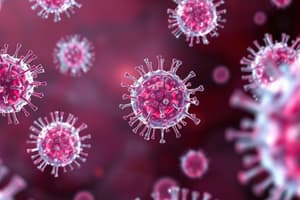Podcast
Questions and Answers
What process leads to the formation of high affinity B cells that can produce memory B cells and plasma cells?
What process leads to the formation of high affinity B cells that can produce memory B cells and plasma cells?
- Somatic hypermutation (correct)
- Class switching
- Cytokine signaling
- Antigen presentation
What is the role of the Fc region of an antibody?
What is the role of the Fc region of an antibody?
- Activating complement pathways (correct)
- Neutralizing pathogens
- Class switching
- Antigen binding
Which type of antibody is considered the most abundant in serum?
Which type of antibody is considered the most abundant in serum?
- IgA
- IgM
- IgE
- IgG (correct)
What determines which B cells survive in the germinal center?
What determines which B cells survive in the germinal center?
Which statement correctly describes class switching in B cells?
Which statement correctly describes class switching in B cells?
What mechanism helps antibodies neutralize pathogens?
What mechanism helps antibodies neutralize pathogens?
Which antibody is primarily involved in allergic reactions?
Which antibody is primarily involved in allergic reactions?
Which of the following best describes somatic hypermutation?
Which of the following best describes somatic hypermutation?
What is the primary role of memory B and T cells after an infection?
What is the primary role of memory B and T cells after an infection?
Which cells are primarily responsible for recognizing native antigens?
Which cells are primarily responsible for recognizing native antigens?
In which locations do T and B cells get activated?
In which locations do T and B cells get activated?
What helps B cells to differentiate into antibody-secreting plasma cells?
What helps B cells to differentiate into antibody-secreting plasma cells?
What is the role of the complement system components C3a and C5a?
What is the role of the complement system components C3a and C5a?
Which process enables an increase in antibody affinity during an immune response?
Which process enables an increase in antibody affinity during an immune response?
What is mainly produced by B cells when they differentiate into plasma cells?
What is mainly produced by B cells when they differentiate into plasma cells?
What happens to most T and B cells after the peak immune response?
What happens to most T and B cells after the peak immune response?
What is the primary role of B cells in the adaptive immune system?
What is the primary role of B cells in the adaptive immune system?
Which type of T cell is primarily involved in killing infected cells?
Which type of T cell is primarily involved in killing infected cells?
What triggers class switching in B cells?
What triggers class switching in B cells?
During the formation of memory cells, which process occurs after the initial immune response?
During the formation of memory cells, which process occurs after the initial immune response?
Somatic hypermutation occurs in which type of immune cell?
Somatic hypermutation occurs in which type of immune cell?
What is the main difference between the recognition of antigens by B cells and T cells?
What is the main difference between the recognition of antigens by B cells and T cells?
Humoral immunity primarily involves which of the following components?
Humoral immunity primarily involves which of the following components?
Which molecule is essential for T cells to recognize antigens?
Which molecule is essential for T cells to recognize antigens?
Flashcards
Somatic Hypermutation
Somatic Hypermutation
Changes in nucleotide sequences of B cell receptors (BCRs), increasing their affinity for antigen.
B Cell Receptor (BCR)
B Cell Receptor (BCR)
A protein on the surface of B cells that binds to specific antigens.
Plasma Cell
Plasma Cell
An effector cell that secretes antibodies.
Memory B Cell
Memory B Cell
Signup and view all the flashcards
Class Switching
Class Switching
Signup and view all the flashcards
Antibody
Antibody
Signup and view all the flashcards
Humoral Immunity
Humoral Immunity
Signup and view all the flashcards
High Affinity B cells
High Affinity B cells
Signup and view all the flashcards
Adaptive Immunity
Adaptive Immunity
Signup and view all the flashcards
T Cells
T Cells
Signup and view all the flashcards
B Cells
B Cells
Signup and view all the flashcards
What do B cells recognize?
What do B cells recognize?
Signup and view all the flashcards
What do T cells recognize?
What do T cells recognize?
Signup and view all the flashcards
Cellular Immunity
Cellular Immunity
Signup and view all the flashcards
Immune Memory
Immune Memory
Signup and view all the flashcards
What do Fc receptors do?
What do Fc receptors do?
Signup and view all the flashcards
How do complement proteins help fight infections?
How do complement proteins help fight infections?
Signup and view all the flashcards
What happens to most T and B cells after an infection?
What happens to most T and B cells after an infection?
Signup and view all the flashcards
How does memory help the immune system?
How does memory help the immune system?
Signup and view all the flashcards
CD4+ T cell
CD4+ T cell
Signup and view all the flashcards
CD8+ T cell
CD8+ T cell
Signup and view all the flashcards
What are the main players in the adaptive immune system?
What are the main players in the adaptive immune system?
Signup and view all the flashcards
What makes B cells different from T cells?
What makes B cells different from T cells?
Signup and view all the flashcards
Study Notes
Adaptive Immunity
- Adaptive immunity is a specialized immune response that targets specific pathogens
- Adaptive immunity involves two fundamental topics in biology
- The adaptive immune system is characterized by its ability to respond to specific pathogens and to develop immunological memory
Cells of the Adaptive Immune System
- The main cells involved are CD4 T cells, CD8 T cells, and B cells
- These specialized cells work together to rid the body of pathogens
Adaptive Immunity Activation
- The adaptive immune system is activated in secondary lymphoid organs, such as lymph nodes and spleen
- Antigens are processed and presented to T cells by antigen-presenting cells (APCs), like dendritic cells
- The activation of T cells requires three signals including costimulation
- B cells are activated by binding to native antigens in their B cell receptors (BCRs)
Cellular Immunity
- Pathogens infect tissues
- Activated dendritic cells (DCs) migrate to lymphoid organs carrying the pathogen
- DCs activate antigen-specific T cells
- T cells proliferate, and some migrate out of the lymph node and become effector T cells
- The effector T cells migrate to infected tissues to clear the infection
- T and B cell activation takes place in secondary lymphoid organs
- Paracortex or T cell zone: where DCs from the tissue meet naïve CD4 and CD8 T cells
- Dendritic cells enter lymph nodes through afferent lymphatic vessels
- B cell follicles: where B cells are found and respond to antigen
T Cell Activation
- T cells require continued activation and sustained differentiation signals
- T-cell recognition involves the interaction of a TCR with an antigen presented on an MHC molecule
- The adaptive immune system is essential for recognizing specific pathogens and developing immunological memory
B Cell Activation
- B cells recognize native proteins or antigens with their B cell receptors (BCRs)
- Antigens that cross-link surface BCRs are optimal for B cell activation
- B cell activation does not require accessory cells
- Smaller antigens and pathogen products drain into lymph nodes
- Dendritic cells carry antigens and pathogens to the lymph node and pass them to B cells
- Smaller antigens are often picked up by macrophages and passed to B cells
B and T Cell Activation
- Some activated CD4 T cells move toward the B cell follicle
- Activated B cells move toward the T cell zone and present peptides from the pathogen on MHCII to activated CD4 T cells
- The T and B cells move together to form a germinal center
- The cells in the germinal center are call T follicular helper (Tfh) cells
Antibody Production
- B cells differentiate into plasma cells which produce antibodies
- The B cell receptors (BCRs) undergo somatic hypermutation and class switching in the germinal center
- Class switching leads to diverse antibody types, such as IgM, IgG, IgE, and IgA
- Antibodies play a role in neutralizing pathogens, activating complement, and enhancing phagocytosis
Cell Response
- Most T and B cells undergo apoptosis after infection or vaccination
- Some cells remain as memory cells, providing a rapid response to future encounters with the same pathogen
- We take advantage of the functions of memory cells during vaccination
Related Concepts
- Pathogens activate DCs to present antigen to T cells; a concept linked to the "Sensing Danger" lecture
- Knowledge of the adaptive immune system is used to improve vaccines; related to the "Vaccination: design and mechanisms" lecture
Studying That Suits You
Use AI to generate personalized quizzes and flashcards to suit your learning preferences.




